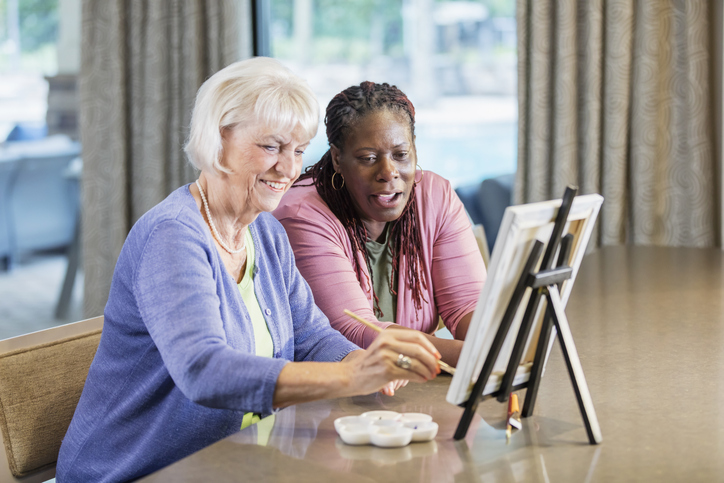
Sensory activities can help reduce anxiety in people with dementia, and we share some do-it-yourself exercises to try.
Swift changes in moods are hallmark symptoms of dementia, and can be hard for family caregivers to work through. One minute you may be enjoying an fun activity together, when ostensibly out of nowhere, the senior’s countenance shifts. You might then end up walking on eggshells while carefully trying to reduce anxiety for the person and calm a situation you do not fully grasp.
Although it’s helpful to identify the main cause behind powerful emotions such as anxiety, agitation, and fear, unfortunately, it is not always possible. There could be a known trigger, like loud noises or fatigue, that can easily be resolved; but there may be more arbitrary triggers, such as the older adult recollecting a distressing memory from many years ago that they are unable to talk about. To help reduce anxiety in older adults with dementia, sensory activities can be helpful.
What Do I Do Now?
After determining that the older adult isn’t in pain or physical discomfort, there are two vital steps to take:
- Journaling: Keep a notebook close by while caring for the senior. Make note of the date, time, and any other facts regarding an occurrence of agitation. For example, note whether or not the senior had just woken up, had just finished having dinner, had not used the bathroom for a number of hours, was watching the news on television, etc. The time of day is particularly important to write down, as individuals with dementia often experience more anxiety in the late afternoon and evening. Journaling will help identify patterns and commonalities to help you prevent future events.
- Distraction/Redirection: After recognizing the feelings the senior is experiencing, it is often effective to move into a different area of the home (or even go outside if the weather is nice enough) and shift the focus to something pleasurable. If it’s been a while since breakfast, a mid-morning snack can help. If the senior is pacing or wandering, try heading out for a walk around the block or to the park. Perhaps listening to favorite music can provide a sense of calm. Try different techniques and document the outcomes in your journal for future reference.
Engaging the Senses
Sensory exercises can help preempt or create distraction from difficult mood swings and reduce anxiety. Try making and implementing some of the following creative ideas from Absolute Companion Care, one of the top home care agencies in Towson, MD and the surrounding areas:
- Perfumed Cards: Cut strips of cardboard and affix perfumed objects in small zip-locked plastic baggies to one end. Use various scents that evoke memories or a sense of calm: peppermint, coffee, suntan lotion, cinnamon, pine needles, chocolate, etc. Use your imagination and discuss each scent while enjoying them together.
- Aquarium Bag: Fill a large zip-locked plastic bag with water beads and a variety of small plastic aquatic animals, plants, etc. Utilize this idea as a jumping-off point to other sensory bags with different themes in line with the senior’s unique interests.
- Homemade Paint: Make up a batch of this safe, nontoxic paint to have readily available, which can be used for either finger painting or brush painting. Blend together ½ c cornstarch and 2¾ c cold water in a pan. Cook and stir over medium heat until it boils. Stir 1 envelope of unflavored gelatin into ½ c of cold water and add to the cornstarch and water. Let the mixture cool, and then divide into different containers, adding different colors of food coloring to each.
Want More Ideas?
Our dementia care experts are full of innovative ideas such as these, along with the skill to help successfully address even the most difficult symptoms of the condition. Our intent is always to make life the very best it can be for the people we serve, every day. Give us a call at 410-357-9640 to learn how we can help and why we’re considered one of the leading home care agencies in Towson, MD and the surrounding communities.
